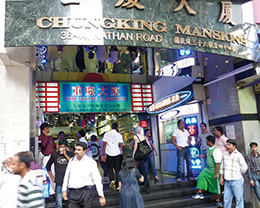Prof. Gordon Mathews project on Chungking
Mansions is featured in the 22nd issue of the Research Grants Council (RGC)’s
newsletter, Research Frontier.
Chungking
Mansions as a 'Global Building'
Chungking Mansions is a building full of
cheap guesthouses, restaurants, and wholesale businesses located in the heart
of Hong Kong’s tourist district of Tsim Sha Tsui. It is where traders,
merchants, temporary workers, and asylum seekers from South Asia and
sub-Saharan Africa come to seek their fortunes. In this research, I sought to
understand the people in Chungking Mansions: how exactly they make their
livings and comprehend their lives. This was pursued through extended
ethnographic research, living in Chungking Mansions for 250 nights over four
years, interacting with and interviewing its residents, and accompanying
traders and merchants to China, India, and Africa to learn about the global
context of their trades and lives.
I found that Chungking Mansions serves as a
central hub of what I term ‘low-end globalization’. This is the globalization
of cheap, often copy goods smuggled across borders, largely under the radar of
states and laws; this is globalization as experienced by most of the world’s
people. I estimate, on the basis of extensive interactions with merchants, that
20% of the mobile phones in sub-Saharan Africa have passed through Chungking
Mansions. The building exists as a hub of low-end globalization because, due to
Hong Kong’s flexible visa policies, it serves as an intermediary between South
China manufacturers and developing-world entrepreneurs. South China, with its
massive production of cheap goods, plays an essential role in spreading the
fruits of globalization to South Asia and sub-Saharan Africa, areas that
otherwise would not be able to experience globalization; Chungking Mansions,
under Hong Kong’s neoliberal rule of law, facilitates this process.
 |
| Prof Gordon Mathews (first from the right) |
I also found out much about all the other
kinds of people in the building, including asylum seekers, who provide the
building with its intellectuals as well as its cheapest labor; Pakistani
merchants, who may have lived in Hong Kong for generations; Indian temporary workers
flying back and forth between Hong Kong and Kolkata every 42 days, carrying
goods to finance their journeys; tourists from all over the world staying in
the building’s guesthouses; Indian and African sex workers plying their trade
and dreaming of becoming middle-class; and Nepalese heroin addicts surrendering
their families’ dreams. All these people play key roles in Chungking Mansions’
low-end globalization.
The primary result of this research is a
book explicating Chungking Mansions through the anthropological lens of
globalization, Ghetto at the Center of the World: Chungking Mansions, Hong Kong
(The University of Chicago Press, 2011). This book depicts the building, the
people in it, the goods that pass through it, the laws that constrain it, and what
it can tell us about the world’s future. Chungking Mansions will eventually
vanish, but our increasingly borderless world will become more and more like
Chungking Mansions, the book predicts. My research on Chungking Mansions has
been profiled in Time Magazine, BBC, CNN, and the Financial Times; the Ghetto
at the Center of the World book has been favorably reviewed in the Wall Street
Journal, The Economist, the Los Angeles Review of Books, and the Times Literary
Supplement, among other newspapers and magazines, and is now being translated
into several languages.
Prof Gordon MATHEWS
Department of Anthropology
The Chinese University of Hong Kong
cmgordon[AT]cuhk.edu.hk
.JPG)

